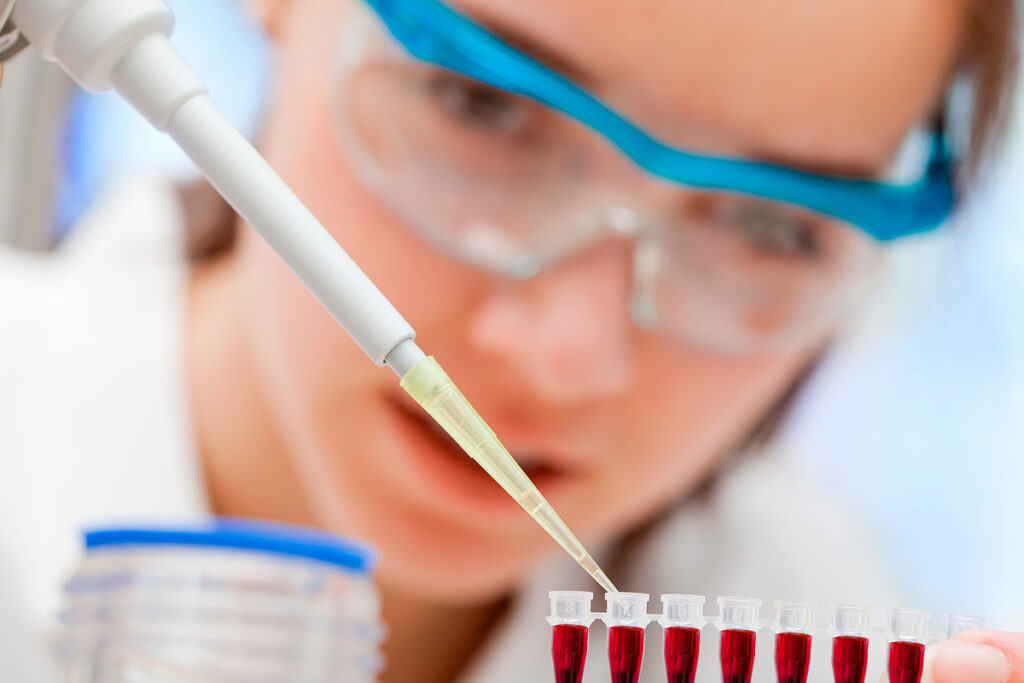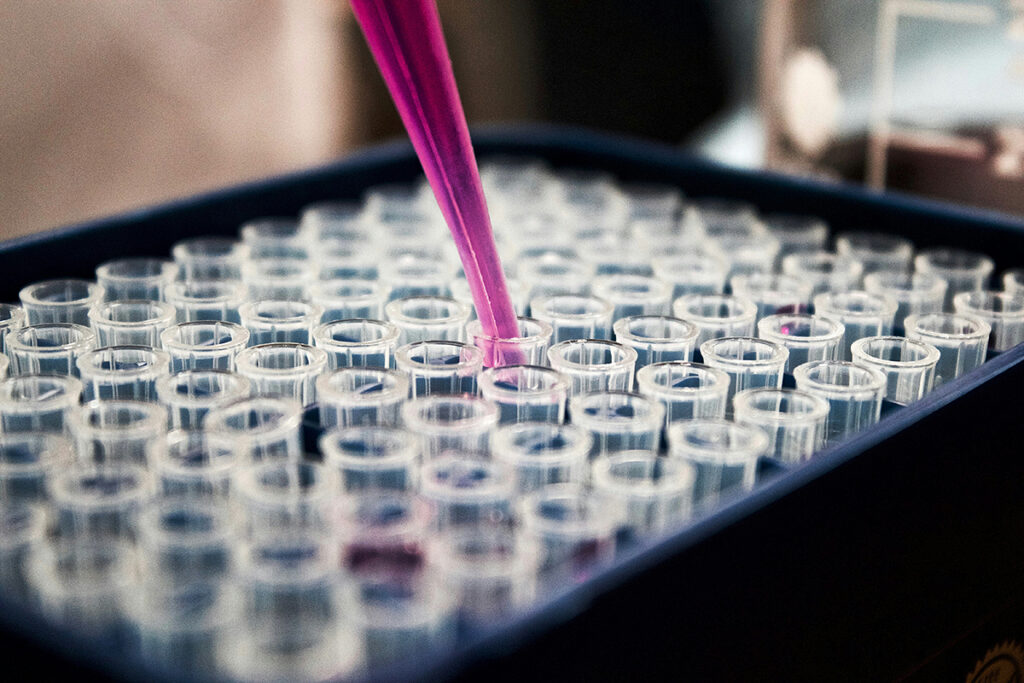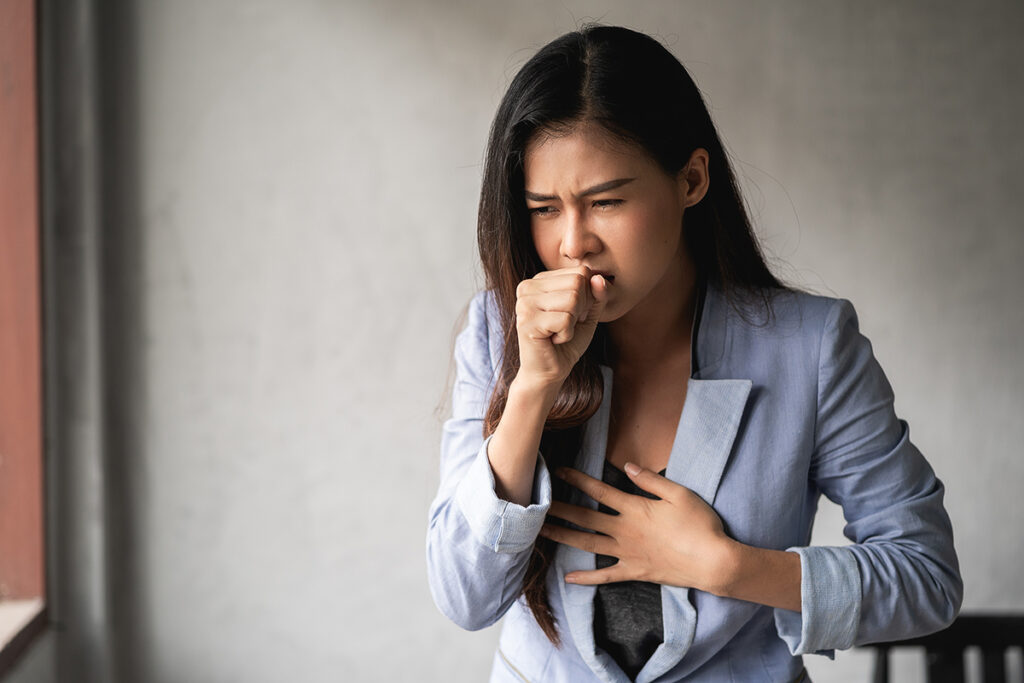For all viral infections, especially those caused by new strains and for which there is no acquired immunity, the severity of the disease depends on innate immune responses. A vital component of the natural immune response is the action of interferons, which have antiviral and immunomodulatory functions.
Interferons are signaling molecules that modulate the immune response to a viral infection. In the risk group of severe COVID-19 – in the elderly, people with chronic respiratory diseases and those who take immunosuppressive drugs – antiviral reactions that depend on interferon-beta worsen. Also, the SARS-CoV-2 coronavirus suppresses cellular interferon production and reduces the initial innate immune response’s strength.
Interferon’s capabilities in the fight against COVID-19
Type I interferons (interferon-alpha and interferon-beta) are effective in vitro against coronavirus infections. Inhaled interferon beta-1a has previously been shown to improve antiviral response and lung function in patients with asthma and respiratory viral infections. Therefore, interferon can reduce the severity of COVID-19 and promote the recovery of patients with SARS-CoV-2 coronavirus.
At Synairgen Research, a British drug development company, scientists evaluated nebulized interferon-beta-1a (SNG001) efficacy and safety to treat patients hospitalized with COVID-19.
SNG001 is a recombinant interferon beta drug developed to treat virus-induced diseases of the lower respiratory tract. The interferon delivery route to the body by inhalation using a nebulizer was chosen to achieve sufficiently high interferon-beta concentrations in the lungs. It would lead to a sustained local antiviral response while limiting systemic exposure to interferon beta, associated with flu-like symptoms.
Previous clinical studies have shown that inhaled SNG001 is well tolerated in patients with asthma and chronic obstructive pulmonary disease. Evaluation of antiviral biomarkers of sputum cells in these patients with and without respiratory viral infections showed that SNG001 enhances antiviral protection of the lungs. SNG001 had a significantly more significant positive effect on lung function than placebo in asthma patients who had symptoms of a respiratory viral infection.
Study of interferon-beta
The second phase of a randomized, double-blind, placebo-controlled pilot study by Synairgen Research involved 101 patients aged 18 years and older who tested positive for the SARS-CoV-2 coronavirus by PCR. Patients were randomly assigned: 51 in the placebo group and 50 in the SNG001 group.
The study did not include those who could not use a nebulizer with a mouthpiece: patients on a ventilator and in the intensive care unit. Also did not include pregnant or planning to become pregnant and breast-feeding.
Patients received 6 million rubles. IU SNG001 through a nebulizer once a day for 14 days, followed by follow-up for a maximum of 28 days.
During the 14-day treatment period and while the patients were in the hospital, vital signs and consciousness levels were recorded twice a day. Besides, pneumonia was assessed daily by chest auscultation. Patients were also evaluated on the WHO Clinical Improvement Scale (OSCI) and the Dyspnea, Cough, and Sputum Scale (BCSS). The OSCI evaluation, blood sampling, and 12-lead electrocardiogram (and chest X-ray if required) were performed 24 hours (±1 day) after the last dose of SNG001/placebo. The use of concomitant medications was recorded throughout the study. Patients were regularly monitored for adverse events associated with the drug under investigation. The final evaluation of the results is 14 days (± 3 days) after the last dose of SNG001/placebo.
WHO Clinical Improvement Scale
| Score | |
| Uninfected | |
| No clinical or virological evidence of infection | 0 |
| Outpatient | |
| No restriction of activity | 1 |
| Restriction of activity | 2 |
| Hospitalized (mild illness) | |
| Hospitalized (without oxygen therapy) | 3 |
| Oxygen through a mask or nasal cannula | <4 |
| Hospitalized (serious illness) | |
| Non-invasive ventilation or high-flow oxygen supply | 5 |
| Intubation and artificial ventilation | 6 |
| Ventilation plus additional organ support: pressors, renal replacement therapy, extracorporeal membrane oxygenation | 7 |
| Fatal | |
| Death | 8 |
Shortness of breath, cough, and sputum scale
| Score | |
| Dyspnea | |
| No | 0 |
| Weak-noticeable when performing strenuous activities (such as running) | 1 |
| Moderate-noticeable even when performing light activities (for example, cleaning the bed or carrying food) | 2 |
| Noticeable – when washing and dressing | 3 |
| Severe – almost constant, present even at rest | 4 |
| Cough | |
| No | 0 |
| Rarely – cough occasionally | 1 |
| Sometimes – less than 1 time per hour | 2 |
| Often – one or more times per hour | 3 |
| Almost constant coughing | 4 |
| Sputum | |
| No | 0 |
| Hardly bothered | 1 |
| Moderately bothered | 2 |
| Noticeably bothered | 3 |
| Highly/constantly disturbed | 4 |
Patients: baseline data
Patients in the SNG001 group had a more severe disease – 37 (77%) patients treated with oxygen therapy (OSCI ≥ 4), compared with 29 (58%) in the placebo group. More patients in the placebo group than in the SNG001 group had diabetes-9 (33%) vs. 3 (12%), or cardiovascular disease – 8 (30%) vs. 5 (19%), and fewer patients had hypertension – 11 (41%) vs. 18 (69%). The average duration of COVID-19 symptoms before treatment was 10 days.
At baseline, 2 patients (2%) received non-invasive ventilation or high-flow oxygen (OSCI = 5), 64 (65%) received oxygen through a mask or nasal cannula (OSCI = 4), 30 (31%) did not receive oxygen therapy (OSCI = 3), and two were hospitalized for reasons of isolation or quarantine, rather than due to the severity of the disease. One patient (1%) had a baseline OSCI score of 2 (activity restriction), and one (1%) had a baseline OSCI score of 1 (no activity restriction).
Changes in the clinical status of the OSCI and BCSS indicators
- The odds of improvement on the OSCE scale were more than twice as high in the SNG001 group as in the placebo group on day 15 or 16, and more than three times as high on day 28.
- Three patients died during the study. All deaths occurred in patients in the placebo group, so no simulation analysis was performed. 11 (22%) patients in the placebo group developed severe disease or died (OSCI ≥ 5) between the first dose and day 16, compared to 6 (13%) patients in the SNG001 group. SNG001 reduced the likelihood of developing severe disease or death by 79%, according to the primary analysis. Additional analysis showed that the difference between the groups was not significant.
- There was no significant difference between treatment groups in the chances of intubation or time to intubation or death. In the placebo group, 5 (10%) patients either underwent intubation or died (OSCI ≥ 6) between the first dose and day 15 or 16, compared to 3 (6%) patients in the SNG001 group.
- Over the 14-day treatment period, patients in the SNG001 group were more than twice as likely to recover compared to the placebo group – 21 (44%) of 48 in the SNG001 group versus 11 (22%) of 49 in the placebo group. On day 28 (final assessment visit), 28 (58%) of 48 patients in the SNG001 group and 17 (35%) of 49 in the placebo group recovered. The chances of recovery on day 28 were more than three times higher in the SNG001 group than in the placebo group.
- There were no significant differences between treatment groups in the chances of hospital discharge or time to hospital discharge. By day 16, 33 (69%) of the 48 patients in the placebo group and 35 (73%) of the 48 patients in the SNG001 group had been discharged from the hospital. By day 28, 39 (81%) of the 48 patients were discharged in the SNG001 group compared to 36 (75%) of the 48 patients in the placebo group.
- Patients in the SNG001 group showed more remarkable improvement on the BCSS scale than the placebo group during the 14-day treatment period. Shortness of breath: more progress in the SNG001 group than in the placebo group. Cough: the difference between the groups is insignificant. Sputum: Sputum discharge was not a problem symptom for the patients in this study.
A significant improvement on the OSCI scale on day 15 or 16 was observed in the SNG001 group compared to the placebo group: the chances of severe illness or death (OSCI ≥ 5) on day 15 or 16 were lower, the time to recover during the treatment period was less, the chances of recovery by 15 or 16 days were higher. There was also a slight reduction in the time to discharge from the hospital.
Safety and tolerability of interferon-beta
- 26 (54%) patients in the SNG001 group and 30 (60%) in the placebo group had adverse events resulting from treatment.
- The most common adverse event was a headache, reported by 7 (15%) patients in the SNG001 group and 5 (10%) patients in the placebo group.
- In the SNG001 group, compared to the placebo group, some fewer patients had severe adverse events – 7 (15%) versus 14 (28%). The most frequent serious adverse events were associated with COVID-19: respiratory failure – 3 (6%) patients in the SNG001 group vs. 6 (12%) in the placebo group, pneumonia – 3 (6%) vs. 3 (6%). All serious adverse events were considered either unlikely or unrelated to the study treatment.
- During treatment, treatment-related side effects were more common in the SNG001 group than in the placebo group – 7 (15%) vs. 2 (4%).
- Cough reported by 2 (4%) patients in the SNG001 group was the most common treatment-related adverse event. Other side effects associated with SNG001, each of which occurred in one patient, included decreased oxygen saturation, diarrhea, dry throat, oral pain, night sweats, and tremors.
- Three treatment-related adverse events led to the study’s discontinuation in three patients in the placebo group: nausea, multiple organ failure syndromes (fatal), and pulmonary embolism (fatal). A third patient in the placebo group died of COVID-19 pneumonia.
Conclusions
Treatment options for COVID-19 remain limited, and the only scientifically proven treatments are remdesivir and dexamethasone. Simultaneously, dexamethasone is indicated only for patients who already require respiratory support, while a lower result is observed in patients with less severe disease. According to one study, remdesivir reduced hospital discharge time by 5 days and increased the likelihood of improving the clinical status assessed by the OSCI. However, another study found that remdesivir had almost no effect on patients hospitalized with COVID-19, as measured by overall mortality, oxygen demand, and hospital stay length.
Additional drugs are needed for COVID-19 patients. Although the results require further study, inhaled interferon beta may be useful in treating coronavirus disease.
Interferon-beta-1a inhaled solution SNG001, administered at a daily dose of 6 million IU via a nebulizer for 14 days, was associated with a higher chance of improvement on the OSCI score compared with placebo and with a faster recovery. However, most of the patients recovered during the 28-day study period. There was a slight decrease in the chances of progression to severe illness or death.
In the placebo group, more patients had severe adverse events than in the SNG001 group. The most frequent serious adverse events in both treatment groups were associated with COVID-19. The most common adverse event that occurs as a result of treatment with SNG001 is a headache. Post-treatment adverse events related to treatment were rare. At the same time, the cough was the only side effect associated with the treatment of SNG001. The cough was observed in more than one (two) patients. Three patients died in the placebo group. There were no deaths in the SNG001 group.
“COVID-19”. There have been concerns that later treatment with interferon may cause or exacerbate the cytokine storm seen in the later stages of severe disease. To avoid the potential pro-inflammatory effects of interferon, in an open trial of interferon beta-1B in triple combination with lopinavir-ritonavir and ribavirin to treat COVID-19, the researchers limited interferon treatment to 7 days from the onset of symptoms. It was concluded that triple antiviral therapy is safe and superior to the lopinavir-ritonavir combination in relieving symptoms and reducing the duration of virus isolation and hospital stay in patients with mild to moderate COVID-19.
In the present study, the average duration of patients’ symptoms was 10 days at the recruitment time, and SNG001 was given daily for 14 days. SNG001 was well tolerated and demonstrated clinical benefit. This fact indicates that there is a much larger window for effective treatment.
Since the second wave of COVID-19 coincides with the winter incidence of colds and flu in the northern hemisphere, the development of broad-spectrum antiviral drugs, such as interferon beta, that enhance local lung protection rather than target specific viral mechanisms, can bring significant benefits to both patients and overburdened health systems.
Useful article, necessary information? Share it!
Someone will also find it useful and necessary:



